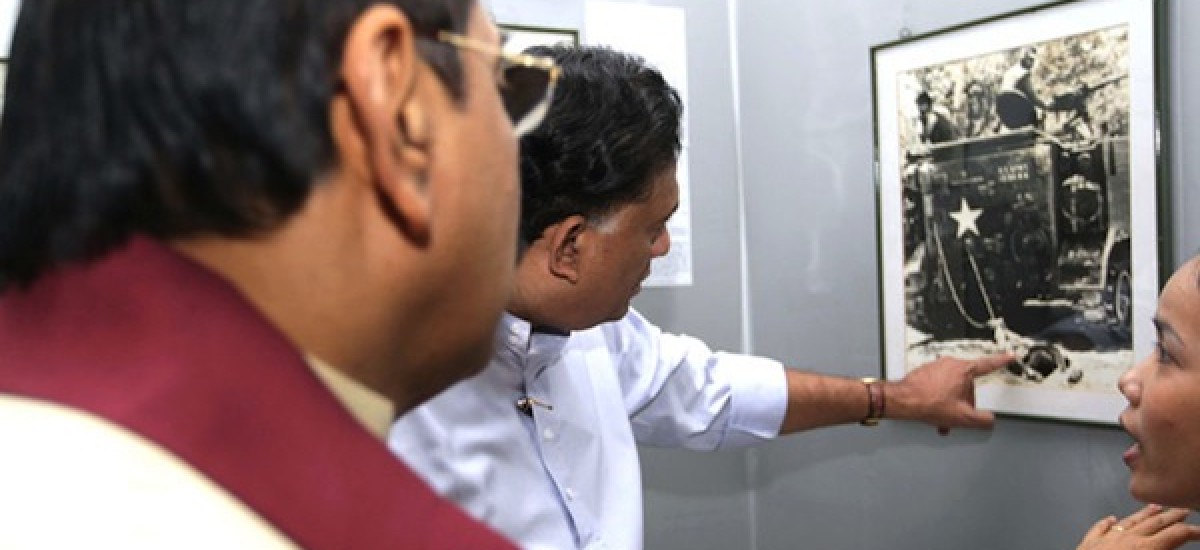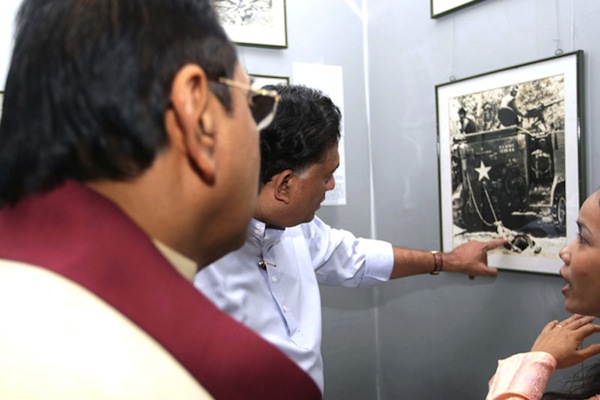The President looking at war crimes in Vietnam. Courtesy Defence.lk
A mapping of differences amongst and alliances within member States of the UN Human Rights Council, reduced to 46 with Libya not qualified to vote till a permanent government is installed in Tripoli, does not show a clean sweep to either side. US would still need another 06 votes even after watering down its Resolution. That says, GoSL would need to stop at least 05 out of that 06 to say, it won again at the UNHCR. Meanwhile the battle rages on in Delhi and Chennai, over what India should do in Geneva.
Indian External Affairs Minister S.M Krishna used a grant of Rs. 500 crores for relief, rehabilitation and resettlement in 2009 June, tractors, seeds and agricultural implements gifted, 50,000 houses lagging far behind schedule now for almost 01 year and 08 months in SL, to convince the Rajya Sabha, that Delhi is doing things for the Tamil people. Krishna told the Rajya Sabha, “We have been assured by the Government of Sri Lanka, including during my visit to Sri Lanka in January this year, of its commitment towards pursuit of a political process, through a broader dialogue with all parties,….”
But the demand by the total TN bloc is for Delhi to support the US Resolution, which now is in a very dilute form, even the date lines taken out. Now the Resolution is not so much about war crimes and accountability. Its almost completely about the LLRC and its recommendations. The demand for investigations on “war crimes and accountability” in this post 9/11 world, by itself is a contradiction.
The US, not only during Bush’s administration, but also now under Obama, did not shift or change its position on “terrorism”. Post 9/11 world with its “terrorism paranoia” allowed Obama to drop his right of veto in December, 2011, allowing a very controversial amendment to the defence bill that funds the US military. Now the bill allows the US military to arrest and detain any US citizen in its soil on suspicion of “terrorism” even without trial and ship the suspect to Gunatanamo bay. The bill was castigated as stripping of individual rights for the duration of “a war that appears to have no end”.
This “post 9/11 world” justifies “extraordinary measures were necessary because terrorism suspects were wholly different to regular criminals.” as explained by Senator Lindsey Graham during the debate on the bill. And she said very clearly, when suspects say, “I want my lawyer,’ you tell them, ‘Shut up. You don’t get a lawyer.” [theguardian.co.uk 15 December, 2011]
Its not that there were no opposition to this bill which negates every decency in this modern world. There was. But on the loosing side, though on the right side as Senator Dianne Feinstein who said, “Congress is essentially authorising the indefinite imprisonment of American citizens, without charge,” adding, “We are not a nation that locks up its citizens without charge”.
Tom Malinowski of Human Rights Watch (HRW) noted, “It’s something so radical that it would have been considered crazy had it been pushed by the Bush administration,” and added, “It establishes precisely the kind of system that the United States has consistently urged other countries not to adopt.”
Numerous such systems are already in place. Violation of rights carried under a new system of “intelligence” gathering makes “white van abductions”, though a serious issue to the people living here in Sri Lanka, wholly irrelevant in the global context of “war against terror”. There is no issue raised therefore, as to how Kumaran Pathmanadan (KP) was abducted and brought to Colombo. Reports regarding his arrest still remains confusing and secretive. Where was he picked up from ? Kuala Lumpur ? Bangkok ? The fact remains, none of the SAARC or ASEAN countries, nor the US or its allies would want to question that abduction. That comfort is there for the regime.
Post 9/11 allows for such illegal anti “terrorism” operations by any government. US had airlifted such “terrorist” suspects to Guantanamo bay torture camps, across the Atlantic, without even the country of origin knowing what or who was airlifted from their soil. At least, the Bin Laden murder was told to the world. Not abductions of “suspects” across borders and from different regions.
It is worth reading the ICJ initiative in 2008 which put together a panel of eminent jurists to study the impact of the “war against terrorism” on human rights violations in the post 9/11 world. Their report titled “Assessing Damage, Urging Action” in very clear, unambiguous terms says, this “war on terror” has severely compromised democracy and human rights even in comparatively safe and democratic States, giving all States an unfair allowance to use every power at their hands in creating very authoritative and repressive mechanisms as “counter terror” mechanisms. It notes, [quote] The report explores important legal issues raised by the war paradigm applied by the US in the current struggle against terrorism. The Panel believes that this paradigm, by conflating acts of terrorism with acts of war, is legally flawed and sets a dangerous precedent.[unquote – pages 8/9]
A dangerous precedent ? On what and what for ? Its quite plain. In their introduction to the report they explain, “….the international legal order based on respect for human rights, built up painstakingly during the second half of the last century, is in jeopardy.” That’s what the “precedent” does.
The Jurists, having spent 03 years taking testimony directly from witnesses in 16 regional, sub-regional and national “Hearings” from around the world, concludes, gathering “intelligence” by different agencies with the advantage at hand of using new technology and trafficking information across borders, has become a serious issue, in safeguarding human rights. There is apparently an unseen co-operation between these agencies, that go beyond formal, accepted diplomacy. [quote] The co-operation has also extended to such illicit practices as extraordinary renditions, secret detentions, enforced disappearances, torture and other proscribed ill-treatment.[unquote – page 11] And it adds at the same time, secrecy can sometimes be no more than a cloak to avoid proper accountability.
It is this “Post 9/11 World” now fostering a pervasive culture of secrecy, that allowed the war in Sri Lanka to be as violent and savage as it was. It is now a big farce for these devotees of democracy and human rights to ask for accountability from a regime they allowed to violate all international law and human rights in lieu of annihilating the LTTE. IF they did not wish to see any violations of international law, if they did not wish a UN member State wage war against its own citizens, there was ample time, ample forums, ample methods that could have been utilised to stop the whole massacre in Sri Lanka, not just during the last phase alone, for them to harp on now.
Despite this war being called a “war without witnesses”, it was a war with “enough evidence”. From the first unilaterally declared “no fire zone” by the GoSL on 21 January 2009, five kilometres North-West of Puthukkudiyiruppu, to the final savage offensive on the banks of Nanthikadal lagoon on 18 May, there were reports and images available to the UN, to all other interested powers in the world including the US and India, on what was happening where and how. There is no blinking on that. They in fact had the privilege of watching all what happened in the “no fire zones” where finally the people were herded into, in real time visuals.
Provided they did not, they still had very clear access to all the information that Gordon Weiss was privy to, as the UN Spokesman in Colombo. There is no reason to believe, they were not immediately briefed about the artillery attacks on the UN “Convoy 11” in the night of 22 January, 2009. That they were routinely being briefed about much more carnage inflicted on the ground in the Vanni every day, was without doubt. But, there was an unwritten, unspoken contract between all governments in the post 9/11 world that prevented any intervention, beyond carefully crafted statements in very mute language. The Liberation Tigers of Thamil Eelam (LTTE), was one of the most ruthless “terrorist” organisations, banned and proscribed in over 34 countries. This Rajapaksa regime therefore had the “right” to annihilate the “terrorists” any way they wished, as the Obama administration does, in Afghanistan.
How and why are allegations on “war crimes” and “accountability” issues then raised in this post 9/11 world ? Campaigns against violations of international law and human rights have nothing to do with the decency and democracy of the governments that run these States in any of these countries. They are dependent on the inclusive and democratic social culture that was developed and groomed at least since the First World War, in most Western countries and what’s left of that by now. Societies in these countries grew over the past 06 or 07 decades, since the decision to establish a “League of Nations” after the Second World War, establishing social values, social ideologies and structures, that paved more and more space for democracy with individual and social “Rights” accepted and entrenched in governance. The international legal order based on respect for human rights, was not written by some crazy individual over a cup of hard brewed local tea, but built up painstakingly during the second half of the last century, creating societies that fought and stood for democracy and peace. For decency, justice, equality and fair play. It was that part of the modern history which created and helped non State actors and structures to emerge for the defence of democracy and human rights in this world.
Based on such ethical and moral living in societies with “rights” for all, that created the anti Vietnam War movement across cities like Paris, Amsterdam, Stockholm, Frankfurt, Oslo, Lyon and New York, Washington DC, in front of the Pentagon and the UN Headquarters, on either side of the Atlantic. The 60’s thus saw massive people’s movements, building a “counter culture” that lobbied and pressured the US administration to withdraw from Vietnam. One that discussed and debated civil rights, freedom of expression and even the right to protest. On that strength, men like Mohammed Ali and singer Joan Baez’s husband, peace activist David Harris challenged the US conscription law.
What we see today is the left over of the 60’s and not an improvement and strengthening of that peace movement thereafter. Yet these non State forces organised into opinionated voices are formidable entities that can still pressure their own governments to honour democracy and peace. The US Resolution and the support it gains, is therefore a compromise between these non State, ideologically democratic social structures and reluctant States. That is why there is always compromise and not straight interventions by these States in powerful countries. That explains the reason for their delay in stopping the massacres in Rwanda and their reluctance in stopping the massacres in the Gaza. Sri Lanka’s tragedy is no exception.
This therefore brings to focus, how democracy and peace could be achieved by people in their own countries. On the strength of their own commitment and on their ideology on democracy and development in an inclusive society. What we instead experience now is a sad lapse of such people’s participation and a call to pin our hopes on a US Resolution that would have very little meaning, IF there is no social backing here within Sri Lanka.


